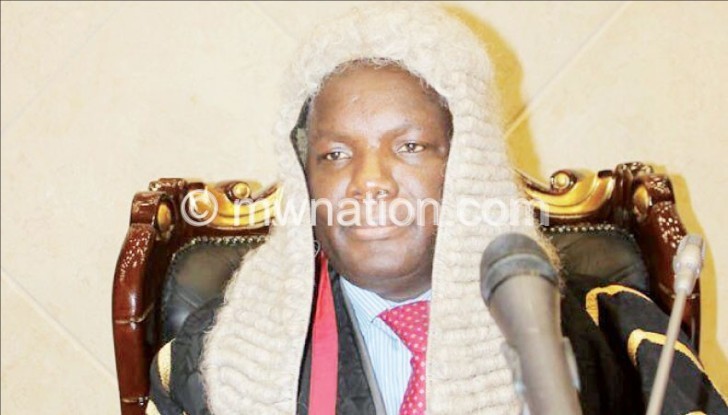GOVT audits parliament
Barely a fortnight after the Executive accused Parliament of extravagance and misuse of public funds, Central Internal Audit Unit (CIAU) of Treasury has started auditing how the Legislature used its budgetary allocation for the past year.
Both Parliament and Treasury confirmed the development, saying the exercise is focusing on the period between July 2014 and September 2015.
Confirming the development on Thursday this week, Parliament spokesperson Leonard Mengezi said the audit team is specifically interested in how the legislative body has used taxpayers’ money during committee meetings, external travel and procurement of vehicles, among other things.

Parliament Richard Msowoya
The audit comes after Minister of Information, Tourism and Civic Education, Jappie Mhango, and Minister of Transport and Public Works, Francis Kasaila, told a press conference in Lilongwe that Parliament had already exhausted over 52 percent of its annual allocation.
Kasaila further alleged that Parliament had used funds meant for convening parliamentary committee meetings for other business.
But contrary to the allegations, Mengezi told journalists in Lilongwe last week that Parliament had so far spent K2.3 billion ($4,001,970) of its K8.3 billion ($14,441,900) allocation for operations, adding that several committees of Parliament held meetings. He even distributed details of the committees’ expenditure from July to September 2015.
According to Mengezi, officials from the CIAU held a preliminary meeting with heads of sections at Parliament where the latter informed them about government’s intentions to scrutinise expenditure at the National Assembly.
“Among general review of Parliament expenditure for the period, the auditors are specifically interested in Parliament budgeting process, the procurement system including purchase of motor vehicles, management of committee meetings and external travel expenditure.
Said Mengezi: “Although Parliament is an independent arm of government, it is still subject to the provisions of the
and other pieces of legislation covering public expenditure. Public Finance Management Act
“Parliament accordingly welcomes the auditors in anticipation of a professional audit which will hopefully clarify some matters that have recently been floating in the media.”
He said the audit team and Parliament on Monday held discussions that were followed by a preliminary audit survey on Wednesday this week.
“Parliament is expecting to be furnished with an engagement letter which will cover the Terms of Reference as well as methodology and the audit programme,” Mengezi said.
Treasury spokesperson Nations Msowoya said the audit exercise is part of CIAU’s normal work as the unit is mandated to audit any public agencies where resources from the government consolidated fund are expended.
He said the audit unit does not limit its auditing to financial years, “but they carry out their work according to the risk mapping that they undertake periodically.”
“Perhaps it’s just a coincidence that there are allegations of misuse of funds at Parliament and at the same time Central Internal Audit has commenced auditing Parliament,” he said, adding that as auditors, they will do their job professionally and approach every issue objectively.
Chairperson for Public Accounts Committee of Parliament Alekeni Menyani welcomed the audit, but encouraged government to spread the exercise to other government institutions.
“This is commendable as far as accounting for public resources is concerned, but let this energy by CIAU be concentrated at Capital Hill because that is where the rot is,” he said.
Ministers Mhango and Kasaila alleged that instead of holding parliamentary committee meetings as expected of Parliament, the legislative arm of government had spent committee funds on external travel at a time the country was
struggling with its economy.
The ministers hinted that authorities of government would take Parliament and its secretariat to task to explain on the “extravagance”.
But Mengezi said several parliamentary committees including Budget and Finance, Legal Affaris, Public Appointments, Defence and Natural Resources held meetings.
The Executive also accused Parliament of unnecessarily blowing K300 million on four vehicles-a Toyota Landcruiser costing about K96 million for Speaker Richard Msowoya and three Toyota Prado VXs costing K80 million each for two deputy speakers and leader of opposition, Lazarus Chakwera, who is also Malawi Congress Party (MCP) president.
In defence, Msowoya said the purchase of the vehicles was legitimate to enable the officers to discharge their duties.
Meanwhile, member of Parliament for Rumphi East Kamlepo Kalua (People’s Party) on Tuesday accused government of turning a blind eye to its own extravagance, saying it recently purchased K4 billion worth of vehicles.
Kalua, speaking in Parliament, alleged that the Executive had spent K650 million to buy Toyota Prado VX models for the presidential convoy and four Toyota Landcruiser V8 models for the Vice-President.
He also alleged that the Executive bought 10 Toyota Prados for senior officials and 30 similar vehicles for principal secretaries in government.
Government leader in the House Francis Kasaila ignored Kalua’s accusation when he stood on point of order. n





